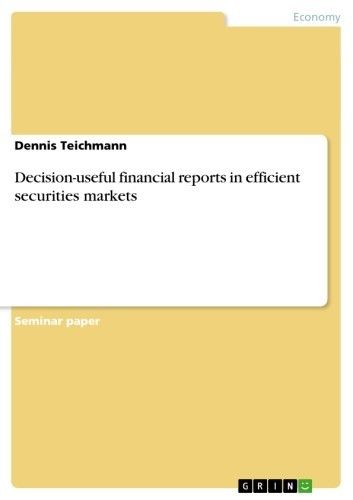| FindBook |
|
有 1 項符合
dennis teichmann的圖書 |
 |
$ 159 電子書 | Decision-useful financial reports in efficient securities markets
作者:Dennis Teichmann 出版社:GRIN Publishing 出版日期:2005-03-08 語言:英文  看圖書介紹 看圖書介紹
|
|
|
圖書介紹 - 資料來源:樂天KOBO 評分:
圖書名稱:Decision-useful financial reports in efficient securities markets
Seminar paper from the year 2002 in the subject Business economics - Controlling, grade: 1,0, University of Hannover (Lehrstuhl für Controlling), course: Seminar zur 'Financial Accounting Theory', 25 entries in the bibliography, language: English, abstract: This paper studies the decision-usefulness of accounting information and the implications of financial reports, especially against the background of efficient securities markets. The decision-usefulness of financial statements gained in importance in the literature of accounting research due to the decline in helpfulness for decision taking of traditional financial statements like earnings, cash flows and stock returns.1 This deterioration is accompanied by a deficit of future-oriented indicators, in particular intangible assets, which are not integrated in the actual financial reporting requirements.2 These outstanding problems lead to incompleteness of capital markets, which are tried to be solved by different mechanisms, e.g. penalties, incentives and voluntary disclosure, to attain to efficient securities markets, the social advantageous solution.3 Section 2 describes the requirements of efficient securities markets, its various forms and the origin of inefficient working securities markets. Chapter 3 illustrates the usefulness of financial statements for different constituencies, especially for investors and management, and the legal standards for mandatory disclosure. Division 4 expresses the information dilemma and presents diverse solutions for an approximation to social optimal allocations, i.e. allocations that diminish securities markets inefficiencies. Chapter 5 gives a short summary of this paper. 1 See LEV / ZAROWIN (Boundaries of Financial Reporting 1999), pp. 354 - 362. 2 See GÜNTHER / BEYER (Value Based Reporting 2001), pp. 1627 - 1629. 3 See SCOTT (Financial Accounting Theory 1997), pp. 81 - 82.
|











